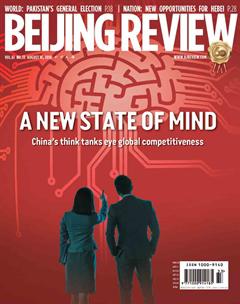Promoting IPR Protection

With the scorching hot summer comes the ratcheting up of the trade war waged by the U.S. against China. The Section 301 investigation, initiated by the U.S. in August 2017, is its excuse for launching the war. To speak out for Chinese enterprises and clarify facts, the Patent Protection Association of China commissioned Wang Zhengzhi and Lian Jie from the Globe-Law Law Firm to participate in a public hearing of the investigation held in mid-May in Washington, D.C.
Beijing Review reporters Zhou Xiaoyan and Zhang Shasha recently held an exclusive interview with Wang, a partner of the firm, on the causes of the Section 301 investigation, the results of the hearing and Chinas achievements around intellectual property right (IPR) protection. An edited excerpt of the interview follows:
Beijing Review: What is a Section 301 investigation? After the World Trade Organization was established in 1995, most countries—including the United States—promised to defuse conflicts through multilateral trade mechanisms and put these types of investigations aside. Why is the U.S. wielding the stick of a Section 301 investigation again?
Wang Zhengzhi: The investigation refers to the 301st provision of the U.S. Trade Act of 1974, known as Section 301. The United States often quotes the provision to retaliate against countries considered to act in an unreasonable and unfair manner in trade.
Illustrated in the 301st provision in detail, a Section 301 investigation aims to protect U.S. domestic industries. From the U.S. perspective, the law was issued to protect the national interests and trade profi ts of U.S. enterprises.
Therefore, all U.S. trade partners may be targeted and bigger ones will be investigated more frequently since the provision is not adopted until the trade volume reaches a certain level. Recently, the bilateral trade volume between China and the United States has grown rapidly. Therefore, the Section 301 investigation has been adopted more often against China.
The investigation will generate many effects and its aims are multiple. First, the law protects U.S. industries, which is the reason why it is supported by many in the country. It also cracks down on rival countries since contain- ing competitors is taken for granted in market competition.
The Made in China 2025 strategy is another reason for the Section 301 investigation. Countries such as the United States are paying close attention to the policy and would not like to see a growing rival. As a result, it has taken various measures to contain Chinas growth.
With the efforts from you and Mr. Lian, what was achieved at the public hearing in midMay?
All stakeholders were entitled to participate in the hearing. Therefore, Chinese stakeholders made their demands heard and revealed the real conditions of Chinese IPR protection to the U.S. side face to face in order to protect the rights of Chinese enterprises.
First, we refuted the statement that China is weak on IPR protection and provided several persuasive cases. Then we pointed out that it is groundless to say that foreign companies can only do business in China through equity joint ventures with Chinese enterprises.
Our opinions were thus delivered to U.S. offi cials and the direct interaction made the facts clearer.
What efforts have been made by China to improve IPR protection and what achievements have been scored?
Over the past decades, China has definitely made great progress in IPR protection with measures including establishing a complete, sophisticated legal system, increasing penalties on IPR infringements, strengthening law enforcement and raising peoples awareness of IPR protection.
First, Chinas IPR protection laws boast a high-level and sophisticated system. The Patent Law issued in 1983, the Trademark Law in 1987 and the Copyright Law in 1990 are the three pillars of Chinese IPR laws. They are on a par with IPR laws of countries with the highest level of IPR protection, especially the civil law system in Germany. We drew lessons from the achievements of German IPR laws and settled the framework of our laws in the 1980s.
Second, we have continuously strengthened IPR protection by improving the judicial system. For example, we are fortifying the penalties on IPR infringements and have stipulated relevant criminal laws in a targeted manner to lower their threshold. In less than 30 years, China has taken many measures to implement laws and improve the judicial system to ensure the effects of IPR protection.
Third, China has streamlined government administrations to improve IPR law enforcement. Government administration was overhauled earlier this year and IPR protection has been commissioned to market supervision authorities. The State Intellectual Property Offi ce has been merged with the State Administration for Industry and Commerce to become the State Administration for Market Regulation, in charge of implementing patent laws, trademark laws, and food and medicine laws. This helps solve the problems caused by a lack of enforcement staff.

In some fields, IPR protection could not reach grassroots level communities and counties because there were no sectors in charge of enforcing relevant laws, let alone professional law enforcers. Making market supervision authorities—which has a powerful system covering almost every corner of the country—responsible for IPR protection helps solve this problem.
Fourth, China is sparing no effort in raising peoples awareness of IPR protection in the whole society. The publicity has been promoted well and now even primary school students know that we should not watch pirated copies of movies. With enough publicity in place, Chinese peoples awareness of respecting IPRs has been greatly raised.
We have made lots of efforts and achieved a lot around IPR protection. Why does the United States continue to criticize us and use this as a pretext for launching a trade war?
First, the United States needs to be more ob- jective. Theres no perfect system in the world. Foreign businesses may cry foul whenever they are disappointed by Chinas legal system, which may have protected them nine times out of 10. We shouldnt only focus on what they say, but rather, we should focus on what they do. Most foreign companies still choose to do business in China even if they have some complaints, meaning that they are generally satisfied with the business environment.
Second, China still needs to increase the promotion of its efforts and achievements around IPR protection to foreign countries through all channels. Its voice is still not fully heard and people from other countries may hold a stereotype about Chinese IPR protection. Therefore, positive publicity of Chinese IPR pro- tection, especially by media outlets with a good command of the English language, should be largely strengthened. In a globalized era, we should objectively and proactively publicize to the world our efforts and achievements around IPR protection.
As trade conflict accelerates, tensions in the IPR field have also increased. How do you suggest Chinese enterprises better protect themselves and defend their rights and interests?
To put it simply, they should take three measures. First, it takes a good blacksmith to make steel, therefore, Chinese enterprises need to strengthen independent research and development and have their own technologies and products.
Second, they should protect their innovations through appropriate approaches under the modern IPR protection system. Its necessary to arm oneself before entering a battlefi eld.
Third, they should commission professionals to carry out IPR investigations before entering an unfamiliar market. Many Chinese enterprises have now started to make Freedom to Operate evaluations by commissioning lawyers to investigate foreign markets before launching products in those markets. Without necessary investigations by professionals, many problems may loom, including tensions between rivals and even trade confl icts.
Currently, the China-U.S. trade conflict is accelerating. What are your predictions on the trade war?
Trade confl icts will continue to exist as long as there are boundaries, customs and sovereign countries, and they may become more frequent as trade volume increases.
First, I think it is not surprising for China and the United States—the two largest economies in the world—to get into trade confl icts. It will not stop or be eliminated in the near future.
But I dont think it will spiral out of control. Any rational administration, at least in China, would prevent the situation from getting to an extreme and causing severe damage to its own economy.
To sum up, things will not get out control but the tensions will last for some time. Trade tensions will be eased after a while because, at the end of the day, development is the common goal of both sides.

